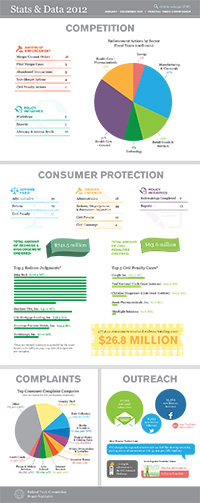The Federal Trade Commission has taken legal action to shut down an operation that allegedly took in millions of dollars from placing charges on consumers’ mobile phone bills, many of which were “crammed” or unauthorized charges.
The complaint against Wise Media, LLC, Brian M. Buckley and Winston J. Deloney is the first FTC case against mobile cramming and part of the FTC’s focus on consumer protection issues that may arise from the explosive growth of mobile technology. The FTC’s complaint asks the court to immediately freeze the defendants’ assets and order them to stop their deceptive and unfair practices. The agency is also seeking a permanent injunction that would force the defendants to give up their ill-gotten gains so they can be used to provide refunds to victims of the scam.
“The concept of ‘cramming’ charges on to phone bills is a not a new one,” said FTC Chairwoman Edith Ramirez. “As more and more consumers move to mobile phones, scammers have adapted to this new technology, and the Commission will continue its efforts to protect consumers from their unlawful practices.”
The defendants allegedly billed consumers for so-called “premium services” that sent text messages with horoscopes, flirting, love tips and other information. The Commission’s complaint alleges that consumers across the country were signed up for these services seemingly at random, and that the operation placed repeating charges of $9.99 per month on mobile phone bills, without consumer knowledge or permission.
According to the complaint, in many instances, Wise Media sent text messages to consumers that suggested they were subscribed to the service, which many consumers dismissed as spam and ignored. Even if consumers responded via text indicating that they did not want the services, they were charged on their mobile phone bills on an ongoing basis.
Wise Media and its operators have taken advantage of the fact that consumers may not expect their mobile phone bills to contain charges from third parties and that Wise Media’s charges appear on bills in an abbreviated manner that does not always clearly designate the company as the source of the charge. As a result, many consumers didn’t notice or understand the charges and paid the bills. To the extent that consumers did notice the charges, the process of obtaining refunds was difficult and often unsuccessful according to the complaint.
The Commission alleges that Wise Media went to great lengths to hide its contact information from consumers. When consumers victimized by the scam were able to find a phone number for Wise Media, its call center employees frequently promised refunds that were never provided.
In the complaint, the FTC alleges that the defendants’ practices were deceptive and unfair in violation of the FTC Act. In addition to Wise Media, Buckley and Deloney, the complaint names Concrete Marketing Research, LLC, alleging that it received ill-gotten funds from the operation.
On May 8, Commission staff is hosting a roundtable discussion on mobile cramming with consumer advocates, industry leaders and government regulators to address how to protect consumers from this growing problem.
The Commission vote authorizing staff to file the complaint was 4-0. The complaint was filed in the U.S. District Court for the Northern District of Georgia.
NOTE: The Commission files a complaint when it has “reason to believe” that the law has been or is being violated and it appears to the Commission that a proceeding is in the public interest. The complaint is not a finding or ruling that the defendant has actually violated the law. The case will be decided by the court.
The Federal Trade Commission works for consumers to prevent fraudulent, deceptive, and unfair business practices and to provide information to help spot, stop, and avoid them. To file a complaint in English or Spanish, visit the FTC’s online Complaint Assistant or call 1-877-FTC-HELP (1-877-382-4357). The FTC enters complaints into Consumer Sentinel, a secure, online database available to more than 2,000 civil and criminal law enforcement agencies in the U.S. and abroad. The FTC’s website provides free information on a variety of consumer topics. Like the FTC on Facebook, follow us on Twitter, and subscribe to press releases for the latest FTC news and resources.

